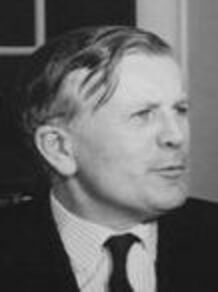
Joseph Grimond, Baron Grimond,, known as Jo Grimond, was a British politician, leader of the Liberal Party for eleven years from 1956 to 1967 and again briefly on an interim basis in 1976.

The 1964 United Kingdom general election was held on 15 October 1964, five years after the previous election, and thirteen years after the Conservative Party, first led by Winston Churchill, had regained power. It resulted in the Conservatives, led by the incumbent Prime Minister Alec Douglas-Home, narrowly losing to the Labour Party, led by Harold Wilson; Labour secured a parliamentary majority of four seats and ended its thirteen years in opposition. Wilson became the youngest Prime Minister since Lord Rosebery in 1894.
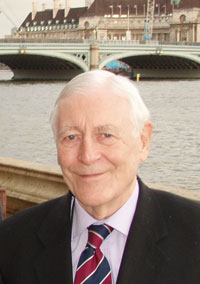
Eric Reginald Lubbock, 4th Baron Avebury, was an English politician and human rights campaigner. He served as the Liberal Member of Parliament for Orpington from 1962 to 1970. He then served in the House of Lords, having inherited the title of Baron Avebury in 1971, until his death. In 1999, when most hereditary peers were removed from the House of Lords, he was elected by his fellow Liberal Democrats to remain. When he died, he was the longest serving Liberal Democrat peer.

The 1967 Liberal Party leadership election was called following the resignation of Jo Grimond, in the wake of disappointing results in the 1966 general election.

James Duncan Gordon Davidson was a British Liberal politician and farmer. He served as Member of Parliament for Aberdeenshire West from 1966 to 1970, when he chose not to stand again because of a family illness.
Alasdair Roderick Mackenzie was a Scottish farmer and politician who became a Liberal Member of Parliament.
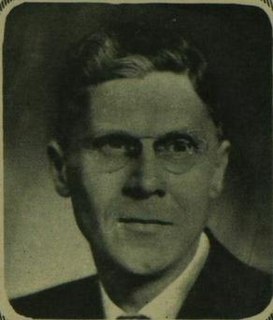
Donald William Wade, Baron Wade, DL was a British solicitor who became a Liberal Party Member of Parliament. Wade's time in Parliament coincided with the time the Liberals were at their lowest ebb but his job as Chief Whip kept the party operating until times were better; however, his own seat was dependent on a local pact with the Conservatives and when it broke down, he was defeated. He was then elevated to the House of Lords where he became an active Peer.
Sir John MacLeod TD was a British army officer, tweed designer and politician who was a Member of Parliament in the Scottish highlands for 19 years.
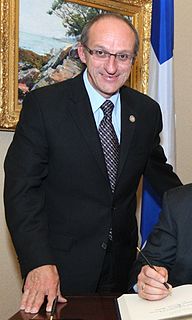
Yvon Vallières is a Quebec politician and teacher. He was a Member of National Assembly of Quebec for the riding of Richmond in the Estrie region from 1973 to 1976 and from 1981 to 2012. Formerly the Minister of Agriculture, Fisheries and Food from 2003 to 2007, he is the current Chair of the Government Caucus. He was a member of the Quebec Liberal Party.
The Radical Reform Group was a pressure group inside the Liberal Party, set up in 1952 to campaign for social liberal and Keynesian economic approaches. According to Andrew Gamble, the Radical Reform Group believed that 'the task of Liberals was not to retreat from Social Liberalism but to propose ways in which the institutions and policies of the Welfare State and the managed economy could be improved and strengthened.'

Archibald James Florence "Archie" Macdonald was a Scottish Liberal later Conservative politician and businessman.
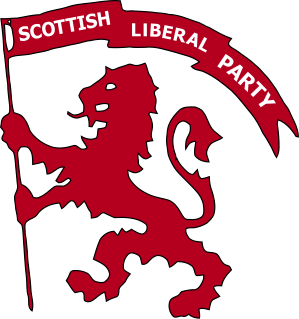
The Scottish Liberal Party, the section of the Liberal Party in Scotland, was the dominant political party of Victorian Scotland, and although its importance declined with the rise of the Labour and Unionist parties during the 20th century, it was still a significant, albeit much reduced force when it finally merged with the Social Democratic Party in Scotland, to form the Scottish Liberal Democrats in 1988.

The 40th Canadian Parliament was in session from November 18, 2008 to March 26, 2011. It was the last Parliament of the longest-running minority government in Canadian history that began with the previous Parliament. The membership of its House of Commons was determined by the results of the 2008 federal election held on October 14, 2008. Its first session was then prorogued by the Governor General on December 4, 2008, at the request of Prime Minister Stephen Harper, who was facing a likely no-confidence motion and a coalition agreement between the Liberal party and the New Democratic Party with the support of the Bloc Québécois. Of the 308 MPs elected at the October 14, 2008 general election, 64 were new to Parliament and three sat in Parliaments previous to the 39th: John Duncan, Jack Harris and Roger Pomerleau.
Members of the British Liberal Party's Frontbench Team from 1945 to 1956 :
Members of the British Liberal Party's Frontbench Team from 1967 to 1976 :
The list that follows is the Liberal Democrats frontbench team led by Paddy Ashdown, who was party leader from 1988 to 1999. Initially known as a frontbench team, the Lib Dems began to refer to their Frontbench Team as a "Shadow Cabinet" during the leadership of Ashdown's successor, Charles Kennedy, although the use of the term is controversial.

Neil Kinnock was Leader of the Labour Party and Leader of the Opposition from 2 October 1983 to 18 July 1992. He convincingly defeated Roy Hattersley, Eric Heffer, and Peter Shore in the 1983 leadership election, which was prompted by Michael Foot's resignation following the disastrous general election result earlier that year. Kinnock's period as Leader encompassed the bulk of the Thatcher premiership and the first two years of the Major premiership. Kinnock resigned in 1992 after losing his second election as Leader.

Michael Foot was Leader of the Opposition from 4 November 1980, following his victory in the 1980 leadership election, to 2 October 1983, when he was replaced by Neil Kinnock at the 1983 leadership election. The 1980 election was triggered by James Callaghan's loss at the 1979 general election, and Foot's own disastrous defeat in the 1983 general election.

The 1997 Dissolution Honours List was gazetted on 18 April 1997 following the advice of the outgoing Prime Minister, John Major. The only honours in this list were 21 life peerages.

The 2005 Dissolution Honours List was issued after the General Election of the same year on the advice of the Prime Minister, Tony Blair.